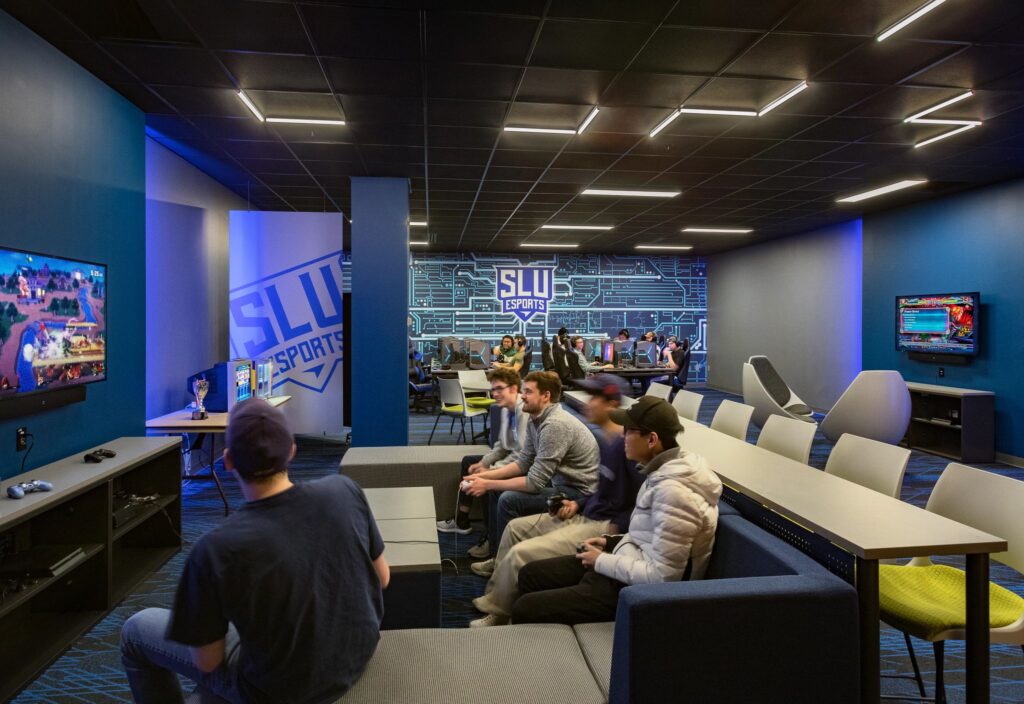What was once considered a niche hobby or pastime has transformed into a powerful force in education. Esports programs are reshaping how students collaborate, think strategically, and engage with technology in meaningful ways. With a growing presence in K-12 schools and higher education institutions, esports is not only providing an outlet for competitive gaming, but also equipping students with critical skills that translate into career readiness and real-world problem-solving.
In response to this growing trend, KI recently published a collection of research examining esports in education, and the impact of well-designed esports environments. Our findings highlight the ways esports contribute to student engagement, social-emotional learning, and pathways into fields such as STEM, media production, and game development. As esports continues to grow, educators and administrators are recognizing its potential as a dynamic learning tool with far-reaching benefits.
The Power of Esports in Education
Educators are increasingly integrating esports programs into their curriculum, recognizing the multitude of benefits competitive gaming offers students. The impact goes beyond entertainment — esports cultivates essential skills that are directly applicable to both academic and professional settings.

Skill Development Through Esports
Competitive gaming nurtures a wide range of skills that are crucial for success in the workforce, including:
- Critical Thinking & Problem-Solving
Esports players must strategize, adapt to challenges, and make split-second decisions, mirroring real-world problem-solving scenarios. - Teamwork & Collaboration
Much like traditional sports, esports requires players to communicate effectively, coordinate efforts, and develop leadership skills within a team setting. - STEM & Digital Literacy
Many esports-related careers have strong foundations in science, technology, engineering, and mathematics, exposing students to essential technical skills. - Resilience & Perseverance
Competitive gaming demands dedication, discipline, and the ability to overcome setbacks, helping students build grit and determination.
Research-backed Benefits
Despite some lingering skepticism, research continues to support the positive impact of gaming in education. Studies show that gaming can enhance cognitive functions, improve strategic thinking, and foster teamwork skills.
Educators are leveraging students’ interest in gaming to introduce them to STEM-based learning, coding, cybersecurity, software development, and artificial intelligence — bridging the gap between recreational play and purpose-driven education.
By integrating esports into educational settings, schools are creating immersive learning environments that engage students in ways traditional methods may fall short.

A New Era of Inclusion and Engagement
Beyond skill development, one of the most compelling aspects of esports is its ability to foster inclusive communities. Traditional sports may come with physical or socioeconomic barriers, but esports provides an opportunity for students of all backgrounds to participate and, most importantly, excel.
Breaking Down Barriers
- Accessibility for All
Esports participation is not limited by gender, socioeconomic status, or physical ability, making it one of the most inclusive extracurricular activities available. - A Sense of Belonging
Students often find a welcoming community in esports teams and gaming clubs. - Improved Academic Engagement
Research indicates that students involved in esports programs tend to show increased school engagement, higher retention rates, and improved academic performance.
Institutional Support and Growth
Schools and universities worldwide are recognizing the value of esports and investing in infrastructure to support competitive gaming. Many higher education institutions now offer scholarships for esports athletes and have even formed varsity-level teams. Organizations such as the National Association of College Esports (NACE) have witnessed rapid growth, with over 240 colleges and universities supporting varsity esports programs.
Additionally, the inclusion of esports in education extends beyond those who are competing. The industry surrounding competitive gaming offers a multitude of career opportunities, from game design, broadcasting, marketing, event management, and data analytics. As educational institutions continue to emphasize career readiness, esports serves as a gateway to thriving industries in technology, entertainment, and business.

Leveling the Playing Field: A Cost-Effective Competitive Outlet
Unlike traditional athletics, which often require significant financial resources, training facilities, and expensive equipment, esports programs present a relatively low barrier-to-entry. This accessibility allows schools of all sizes to implement programs, giving students the opportunity to compete at local, national, and even global levels.
Esports is Affordable and Scalable
- Minimal Equipment Costs
Unlike sports that require large fields, stadiums, or extensive gear, esports primarily requires computers, gaming consoles, and a stable internet connection. - Equal Opportunities for Small Schools
Smaller institutions that may struggle to maintain large athletic programs can still offer students a competitive outlet through esports. - Scholarships and Sponsorships
With the growing investment in esports from colleges, professional organizations, and sponsors, students have new pathways to higher education and career opportunities.
Beyond the competition itself, schools are prioritizing student health and well-being by integrating fitness and ergonomic best practices into esports training. Coaches emphasize physical conditioning, mental preparedness, and healthy gaming habits to ensure students develop a balanced approach to competitive gaming. These efforts further legitimize esports as a structured and beneficial activity within educational settings.
The Future of Learning: Esports as a Catalyst for Career Development

Esports is not just a passing trend — it’s a powerful tool that is shaping the future of learning, student engagement, and career preparation. As technology continues to evolve, esports equips students with the digital fluency, problem-solving abilities, and teamwork skills necessary to thrive in rapidly changing industries.
Educational institutions that embrace esports are unlocking new opportunities for students, fostering inclusive learning environments, and preparing the next generation for a tech-driven world. Career opportunities stemming from esports include:
- Software and Game Development
Encouraging students to explore coding, game design, and programming. - Broadcasting and Content Creation
Providing real-world experience in media production, streaming, and digital storytelling. - Cybersecurity and IT Management
Teaching students the critical skills needed for protecting digital infrastructure. - Event Management and Marketing
Exposing students to the business and operational side of esports tournaments and sponsorships. - Data Science and Analytics
Helping students understand performance metrics, game theory, and predictive modeling.
Esports as a Catalyst for Future-Ready Skills
Whether through direct competition, STEM integration, or exposure to new career pathways, esports is proving to be a valuable tool in modern education, and the impact extends far beyond the screen, influencing career readiness, technical proficiency, and critical thinking skills.
The growth of esports in education signals a shift in how learning environments engage students. By embracing esports, schools can offer students new opportunities for engagement, foster collaboration, and equip them with the skills needed for the future job market. As this field continues to grow, the role of educators and administrators will be instrumental in ensuring esports remains a meaningful and enriching part of the educational landscape.
Learn More
This article provides an overview of our research findings. For a comprehensive look at how esports can transform education and prepare students for brighter futures, get access to our full white paper, “Game On! How Esports in Education Can Prepare Students for Brighter Futures.”

